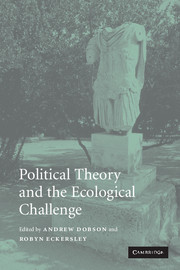3 - Socialism
Published online by Cambridge University Press: 06 July 2010
Summary
Introduction
Far from being a challenge, ecology greatly enhances the case for a redefined and refocused socialism. From its origins in the early nineteenth century, socialism has been a diverse and contested philosophy. Socialist principles and practice have been undermined and discredited through failures, atrocities and authoritarian activities undertaken in its name. By the late twentieth century, socialism had all but lost the ideological battle against a radical version of capitalism that rejected any political or social interference with ‘free’ market systems.
One of the most notorious clarion calls of capitalist market radicalism in Britain was that there was ‘no such thing as society’ and ‘no alternative’ to the market. State welfare systems were condemned as the ‘nanny’ state. Throughout the long, but ultimately unsustainable, boom of the late twentieth century, socialists were unable to mount an effective challenge to the inequalities and destructiveness of the globalised industrial capitalist system. Instead, variants of market socialists, social democrats and New Labourites tried to ally themselves to the ‘new reality’. They accorded to capitalism the role of ‘wealth creation’ and waited patiently for taxable crumbs to fall from the capitalist table. At the beginning of the twenty-first century, confidence in the ability of globalised capitalism to achieve the worldwide freedom and prosperity it promised faltered. Even those at the heart of the project expressed their doubts, most notably the Nobel prize-winner and former Chief Economist at the World Bank, Joseph Stiglitz (2002).
- Type
- Chapter
- Information
- Political Theory and the Ecological Challenge , pp. 35 - 50Publisher: Cambridge University PressPrint publication year: 2006
References
- 3
- Cited by

